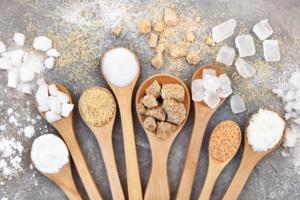![]() EXPERT
EXPERT
Dr. Rex L. Mahnensmith
Internist
- Waterbury, Connecticut
- MD at Yale School of Medicine
- Accepting new patients
Five Life Habits That Make A Difference For Health and Survival
Habitual tobacco use, irregular and insufficient exercise, regular intake of alcoholic beverages above a minimal amount, being overweight for one's height, and sleeping less than 7 hours per day are linked to poor health....
Goals for the Care of Diabetes Mellitus
Diabetes Mellitus is defined by elevated blood glucose concentrations. Blood glucose concentrations should reside below 100 mg/dL during fasting time periods. Biologic Normal...
Knowing All About Sugar Essential for Life but Potentially Unhealthy Part 1 of the Diabetic Story
Sugar is the familiar and common name for sucrose, a naturally occurring substance in nature that is formed in plants from the combination of water absorbed from soil and carbon...
Knowing All About Sugar: Blood Vessel and Tissue Injuries Develop When Blood Glucose Concentrations Circulate Above Normal Even For A Short Time:...
Glucose is the essential energy molecule that our body's tissues utilize. Glucose exists in fruits and vegetables and grains, either as a simple sugar or as a structural component...
Knowing All About Sugar: Essential for Life but Potentially Unhealthy: Part 1 of the Diabetic Story
Sugar is the familiar and common name for sucrose, a naturally occurring substance in nature that is formed in plants from the combination of water absorbed from soil and carbon...
Vitamin K2: A Little Known Vitamin That We Now Know Reverses and Prevents Artery Calcification and Promotes Bone Matrix Calcification
A “vitamin” is a nutrient essential for life. We are well-acquainted with most vitamins, such as vitamin A, the B-vitamins, and vitamins C, D, and E. Each has a well-known and...
Why Delve Deeply into Our Daily Nutrition? Because we Become what we Eat!
Our daily food and beverage intake may be a matter of deep thought and careful selection. Or, our daily food and beverage intake may be a matter simply of convenience, routine,...
Vaccine?
Rex
Pea sized thing moving freely on the right side of my scrotum and it isn't the testicle?
Rex
Pectus Carinatum causing shortness of breath?
Pain in the chest going to the left shoulder?
Pleomorphic adenoma?
How long will my leg be numb after saphenous nerve ablation?
Rex
Should I go to the ER?
Is chest pain normal after stent placement?
Urgent diarrhea?
I share your concerns and worries. Your intestines are 'irritable' and 'inflamed.' Precisely why is essential to know. And planning remedies centers on the 'why.' Essential studies include:
gastric emptying study; intestinal capsule-scope study; intestinal transit study; CT enterography study; plasma Immunoglobulin IgA level; Immunoglobulin IgE level; colonoscopy if not done; Helicobacter pylori evaluation by Upper Endoscope with biopsy and by Urea Breath Test; serum gastrin level; serum lipase level; liver function tests; food allergy blood test profiles; and then pre-biotic and probiotic capsule intake daily; may need CDIFF test and treatment; may need intestinal antibiotic therapy with xifaxin; may benefit from dicyclomine; diet adjustments to eliminate fats and simple carbs essential also.
Rex
What can you not eat with a heart stent?
- BEST meal plans include plenty of vegetables, and very little sugars and mixed fatty meat - i.e. eating complex carbohydrates, primarily from vegetables, and consuming only very lean nonfat protein foods.
- Foods to eat daily and faithfully include complex carbohydrates such as quinoa, oatmeal, fruits, vegetables, beans, and lentils; lean meats which have no or very little fat; and NO sugar foods or breads or pastas
- DO NOT EAT:
- Pizza, pasta, white bread, muffins, potato, juices, soda, cookies, pastries;
- Fatty meats, such as bacon hamburger sausage fried chicken, pork with fat, beef with fat - carve out all fat from any beef or pork or chicken or turkey - make it super lean always;
- Any saturated fats, which are animal fats, poultry fats, creams, whole milk, ice cream.
- Sodas (regular and diet),
- Refined sugars,
- Processed carbohydrates (breads, cereals, cookies, cakes, most pasta, white polished rice, muffins, bagels)
- Trans fats, high-fat animal products = any visible fat solid at room temperature
- High-fat dairy products = whole milk, ice cream, heavy cream
- High fructose corn <https://www.medicinenet.com/corns/article.htm> syrup = avoid - this is added
- Artificial sweeteners
<https://www.medicinenet.com/artificial_sweeteners/article.htm> = avoid
-Fried foods = avoid all fried foods
- What To eat:
-V8 Fusion Juice - Diet Version - Best Juice
-Skim Milk or Soy Milk or Almond Milk
-Unsweetened Tea or Coffee
-Whole Vegetables
-Whole Fruits with no syrup or juices
-Lean Meats with NO VISIBLE FAT
-Fish NOT FRIED
-Whole Grain: High Fiber Oatmeal, Granola, Whole Rice, Beans, Quinoa
COUNT Calories - and Grams of Carbs - and GRAMS of FATS EACH DAY
- Calorie intake: aim for 1600 kcal per day = NO MORE
- Protein intake: aim for 60 grams per day.
-Fat Intake: Less than 15 grams per day = NO MORE
CREATE MEAL PLANS - PORTION SIZE - FOOD TYPES
COUNT CALORIES, CARB Grams, FAT Grams per MEAL
Keep notes!! A meal plan is essential.
1.20-25 GRAMS OF CARBS
1.Complex Carbs
2.Not Simple Sugar Carbs
3.Minimal Bread/Pasta/Processed Carb
2.10 GRAMS of FATS
1.Plant Fats MOSTLY
3.30-40 GRAMS of PROTEIN
1.Very lean - Eggs, Fish, White Meat
4.Minimize Simple Carbs
5.Minimize Animal Fats
6.Small-Medium Portion Size is Essential:
- The carbohydrates consumed should be low glycemic load and come primarily from vegetables.
- The fat and proteins consumed should primarily come from plant sources - or egg - or fish - or very, very lean meats.
Learn the Glycemic Load of daily foods. Carbohydrates (carbs) are the primary food that raises blood sugar. Glycemic <https://www.medicinenet.com/high_and_low_glycemic_index_foods/article.htm> load indicates how much sugar/glucose is eaten per food!!
- Foods with low glycemic load raise blood sugar modestly and thus are better choices for people with diabetes.
- Carbohydrates can be classified as either:
- Complex carbohydrates - Low Glycemic Load
- Simple sugars - High Glycemic Load -- Avoid
Complex carbohydrates (low glycemic load foods, or foods that are a part of a prevent diabetes plan) are mostly UNPROCESSED - and WHOLE. Examples of complex carbohydrates, or low glycemic load (index) foods include:
- Brown rice
- Whole wheat
- Quinoa
- Steel-cut oatmeal
- Vegetables
- Fruits
- Beans
- Lentils
Whole grains, such as brown rice, quinoa, and oatmeal are good sources of fiber and nutrients; and have a low glycemic load making them good food choices. Processed food labels make it very confusing to understand whole grains. For example, "whole wheat bread" is made in many different ways, and some are not that different from white bread in its blood sugar impact (glycemic load). The same is true for whole grain pasta, it's still pasta. Whole grains raise blood sugar much less. Choose whole grains that are still in their grain form like brown rice and quinoa, or look at the fiber content on the nutrition <https://www.medicinenet.com/nutrition/article.htm> label. For example, a "good" whole grain bread will have 3+ grams of fiber
per slice.Starchy vegetables should not be eaten daily - or regularly
Klebsiella Pneumonia found in my throat swab?
Severe recurring localized headaches?
Can headsets cause skull indentations?
Rex
Why do I have persistent coughing weeks after recovering from covid?
Constipation?
Rex
I smell fecal for no apparent reason?
The essential remedy is colon cleanse with a product that cleans colons completely. The cleanse agent used pre-colonoscopy is best. Stay hydrated. Then adjust your intake. Prebiotic capsules daily. Probiotic capsules daily. Senna capsule daily. Be sure you have one to two bowel evacuations each day. Minimize simple carbs. Minimize dairy. Minimize animal fat. Best diet is Mediterranean Diet. Minimize soda. No alcohol. Yes, take an acid blocker daily. Whole fruit and whole vegetables are fine. High fiber is best. The basic problem is intestinal overgrowth and stasis and leaky gut syndrome. Get Lectin Shield.
Lupus and Rheumatoid Arthritis?
Your ailments are substantial as you describe. The autoimmune ailments are able to be modified and remediated with a combination approach. Plaquenil. Steroids. Immune suppressants. Biologics. And massage therapy and physical therapy help. The multi modal therapy approach is essential.
Low White Blood Cell count?
Rex
Mild Non Specific Urethritis and Conjunctivitis Undiagnosed?












